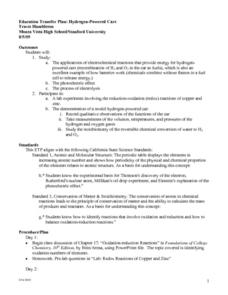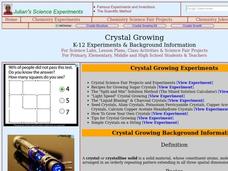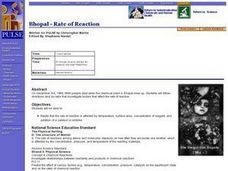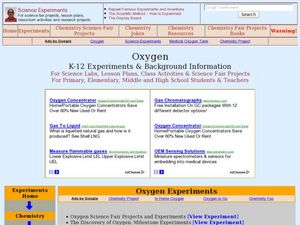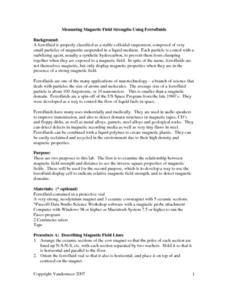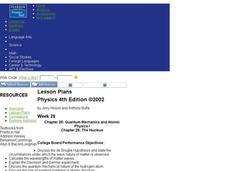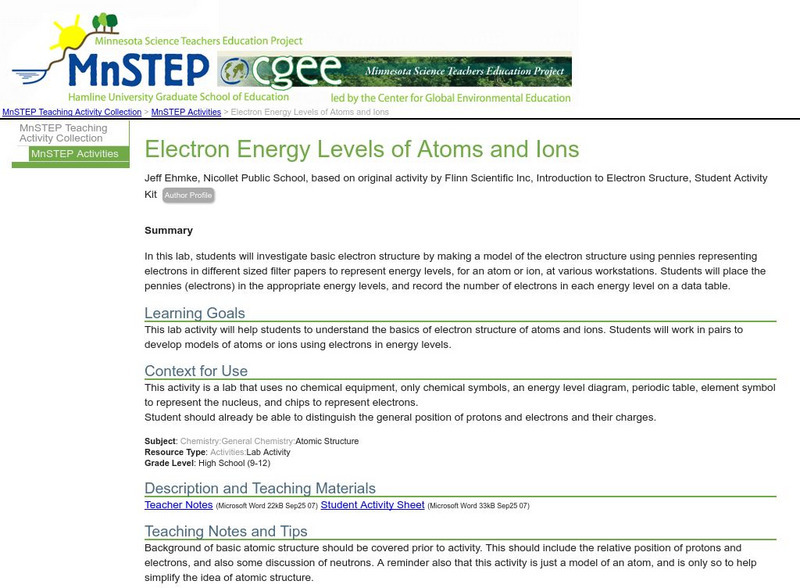Curated OER
The Effects of Temperature on Chemical Mixtures
Students explore chemical cahnges and the effect of temperature on chemical mixturees, They make observations of the behavior and appearance of certain chemical mixtures and reactions.
Curated OER
Hydrogen Powered Cars
Young scholars apply the principles of chemistry to investigate the concept of how a hydrogen powered car works. They study the electrochemical reactions that provide the energy source. Students also record observations in the...
Curated OER
Radioactivity Experiments
Students study the difference between types of ionizing radiation and how elements are transmuted. They determine that radiation is normal and surrounds us. They calculate the amounts of alpha, beta and gamma radiation emitted from a...
Curated OER
Crystal Growing
Students explore the different phases of a crystal. In this mineral lesson students grow their own sugar crystals using a sugar recipe.
Curated OER
Bhopal - Rate of Reaction
Students determine that the rate of reaction is affected by temperature, surface area, concentration of reagent, and addition of a catalyst or inhibitor. They observe that on December 3rd, 1984, 8000 people died when the chemical plant...
Curated OER
Grating Spectrometer
Students calculate the Balmer series. In this physics lesson, students observe hydrogen lamp spectra using spectrometers. They calculate wavelength and compare them with their theoretical calculations.
Curated OER
Poster Assignment: Sports Chemistry
Tenth graders distinguish between chemical and physical properties and changes in matter when given specific examples. They view a video of sports activities. Students chose their favorite sport and design an experiment to improve sports...
Curated OER
Periodic Table Lesson Plan
Pupils describe how elements are arranged on the periodic table. They compare metals, nonmetals, and metalloids based on their properties and on their locations in the periodic table. Students describe the differences between a period...
Curated OER
Oxygen
Students explore oxygen and its physical and chemical propeties. In this investigative activity students complete several experiments using oxygen.
Curated OER
Igniting Chemistry in Fireworks
Students watch a video segment and read text about the color of fireworks. Students watch a video segment and do an interactive activity on the mechanics of a firework.
Curated OER
Igniting Chemistry in Fireworks
Young scholars watch a video segment and read text about the color of fireworks. Students watch a video segment and do an interactive activity on the mechanics of a firework.
Curated OER
Igniting Chemistry in Fireworks
Young scholars watch a video segment and read text about the color of fireworks. Students watch a video segment and do an interactive activity on the mechanics of a firework.
Curated OER
Measuring Magnetic Field Strengths Using Ferrofluids
High schoolers explore the field of nanotechnology by examining magnetic field strength in ferrofluids. They use probes attached to a computer program to determine the relationship between magnetic field strength and magnetic field lines.
Curated OER
Quantum Mechanics and Atomic Physics
Students will discuss the de Brogile Hypothesis and state the circumstances under which the wave nature of matter is observed. They will also calculate the wavelengths of matter waves.
Science Education Resource Center at Carleton College
Serc: Electron Energy Levels of Atoms and Ions
In this lab, students investigate basic electron structure by making a model using pennies and different sized filter papers.
Lawrence Berkeley National Laboratory
Berkeley Lab: Particle Adventure: The Standard Model
An introduction to the Standard Model, a theory which attempts to explain atomic structure using leptons, quarks, and force carrier particles.
Thomas Jefferson National Accelerator Facility
Jefferson Lab: All About Atoms
The three basic particles that make up atoms are defined and illustrated.
Concord Consortium
Concord Consortium: Structure of an Atom
Observe the probable location of electrons around an atom. Trace the electrons over time to draw conclusions about where electrons are likely to be found around an atom's nucleus. How does the trace pattern relate to the electron cloud...
Science Education Resource Center at Carleton College
Serc: Properties of Cations: Flame Test Lab
In this lab, students will learn the relationship between color emitted by atoms of metal compounds and their electron structure by using the flame test.
National High Magnetic Field Laboratory
Magnet Academy: Timeline of Electricity and Magnetism: 1910 1929
Scientists' understanding of the structure of the atom and of its component particles grows, the phone and radio become common, and the modern television is born.
Lawrence Berkeley National Laboratory
Berkeley Lab: Basic Nuclear Science Information
Site provides the ABC's of nuclear science including radioactivity and gamma decay to fission and comic rays.

